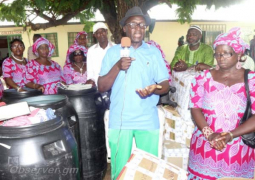
The survey further showed that The Gambia has achieved the 70 per cent target for TB case notification, that is, the proportion of new cases detected by TB control services.
“This target was probably attained up to five years ago, which together with high treatment success means the country has met all DOTS targets,” announced Dr. Ifedayo Adetifa, clinical epidemiologist at the MRC Unit-The Gambia in Fajara, at the press conference held Monday in Banjul as part of activities to mark World TB Day 2014.
“However, it is not time to rest or celebrate, because despite reaching all the DOTs targets for case detection and treatment success, the number of cases diagnosed annually remain stable, suggesting new or complementary strategies and efforts are required to achieved the goal of the national TB strategic plan, that is, to reduce the burden of TB to a point where it is no longer a public health problem in The Gambia.”
The partners in the survey were the ministry of Health and Social Welfare in Banjul working through the National Leprosy and Tuberculosis Programme, the implementing partner MRC-The Gambia Unit at Fajara, the National Public Health Laboratories, WHO-Geneva and WHO-The Gambia office, with funding from the Global Fund to fight AIDS, TB and Malaria as well as the MRC.
In a statement delivered at the press conference, Dr. Adetifa revealed that “for the first time since the country’s independence and since WHO conducted surveys in the 1950s, we now know the burden of TB by measurement and not through the usual estimates generated from mathematical models as is the case with most low and middle income countries.”
The objectives of the survey were to establish the burden of TB disease; estimate the proportion of cases detected and treated by the NLTP; and, to identify the causes of low TB detection (if present) in The Gambia.
The survey team covered Banjul to Koina and enumerated 100,678 Gambians in 13,857 households, invited 55,831 eligible persons to participate in the survey, and conducted symptom screening and chest X-rays for 43,100 participants.
“The key findings are: The overall national prevalence of all forms of TB in The Gambia is 128 per 100,000 of the population, which is 3.8 times lower than the 490 per 100,000 estimate in the 2013 Global TB Report; The estimated prevalence of smear positive TB is 57 per 100,000 population compared to the 292 per 100,000 estimate; The updated TB case notification rate is now 130 per 100,000 population; The revised TB incidence for The Gambia is 175 per 100, 000 of the population.
“Other key findings are: The prevalence of pulmonary TB (where TB was grown in sputum samples in the laboratory) is 3-times higher in males compared to females; The prevalence of smear positive TB prevalence (TB is seen under the microscope) is 4 times more in males compared to females; The prevalence of TB (where TB was grown in sputum samples in the laboratory) was 1.5 times higher in urban areas dwelling compared to rural areas; The majority of survey detected TB cases (95%) were new and not on treatment at diagnosis.”
Dr. Adetifa conveyed to the journalists attending the press conference “warm greetings and felicitations from the new MRC Unit Director, Prof. Umberto d’Alessandro… In addition, he has asked me to re-state the MRC’s continued commitment to TB research in The Gambia, support and partnership with the MoHSW and National Leprosy and TB Programm,as we all work towards controlling or eliminating TB in The Gambia.”
He ended thus: “In conclusion, a new phase of TB control efforts is now required in The Gambia. Using the results of the TB prevalence survey, we need to plan and revise our strategy taking an evidence-based approach. We need to find answers to questions such as: Where does TB transmission occur in The Gambia? What are the networks of transmission? How do we scale up activities aimed at the high-risk groups- men, persons living with HIV/AIDS, household contacts of TB patients, children, diabetics, and so on? What new diagnostic tools and algorithms can we put in place to improve detection?
The MRC official recalled that, “in 2013, we had this event with the slogan, ‘STOP TB in our lifetimes’. The slogan of this year’s World TB day is ‘Reach the 3 million’.“
He continued: “At the 2013 event, I highlighted the need to obtain a full understanding of the extent to which TB is present (that is, the burden) so that TB control efforts are appropriately planned.”
“The answers to these questions (above) and more will enable us find, treat and cure our own share of the 3 million undetected cases globally,” he declared.
Programme manager’s statement
The programme manager of the National Leprosy/TB Control Programme, Adama Jallow, in briefing the media, said their goal is “to reduce transmission, morbidity and mortality of TB so that it is no longer a public health problem in The Gambia.”
The national programme’s objectives include, to improve the management of respiratory patients in health facilities. The implementation strategies include, strengthening of laboratory services, and increasing the number of TB diagnostic centres in the country.
Mr. Jallow went on to spell out the achievements of the programme. These include, “high political commitment” by the Gambia government; diagnosis and treatment of TB is provided free-of-charge to all irrespective of nationality; there has not been any stock-out of anti-TB drugs in The Gambia;and, the treatment success rate increased to 88 per cent, exceeding the WHO global target of at least 85 per cent.
Minister’s statement
Meanwhile, in his statement to mark World TB Day, the minister of Health, Dr. Omar Sey, said the country has over the years made significant progress in the fight against TB. He said the activities lined up include a series of awareness-creation activities such as the press conference with health journalist, radio/tv phone-in programmes and a panel discussion all carried out during the week in commemoration of the day.
The event will also be celebrated at the regional level, coordinated by each of the regional health teams.
The minister thanked all health care workers, voluntary organizations, individuals,
Private sector and donor Partners for their participation in the fight against TB in The Gambia.
“I am confident that with this result-oriented collaborative partnership between the Ministry of Health and Social Welfare, the WHO, MRC, and the Global Fund to Fight TB/HIV AIDS/Malaria, we will continue to make significant progress in our efforts to control TB,” he added.



